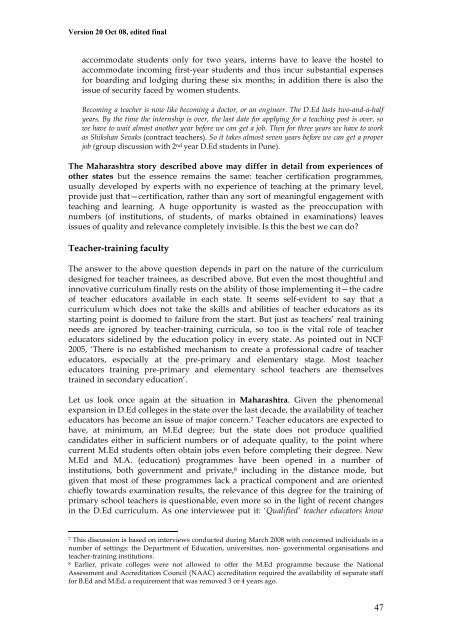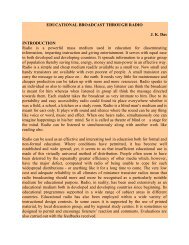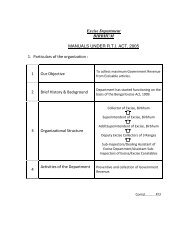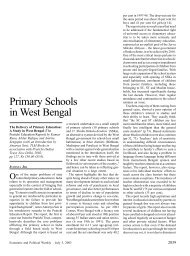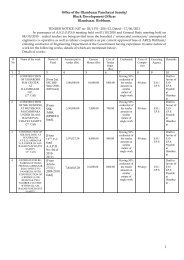Version 20 Oct 08, edited finalinstitutions <strong>of</strong>fering training, nor even <strong>the</strong> possibility <strong>of</strong> planning trainingworkshops ahead <strong>of</strong> time. In <strong>the</strong> case <strong>of</strong> IASEs, although some workshops were heldduring <strong>the</strong> last financial year, funds had yet to be released by MHRD during <strong>the</strong>current year for this activity.Teacher educators at D.Ed colleges, <strong>the</strong>mselves <strong>of</strong>ten poorly equipped <strong>and</strong> workingin institutions with inadequate infrastructure <strong>and</strong> facilities are thus left to strugglewith a host <strong>of</strong> problems, both academic <strong>and</strong> administrative.On <strong>the</strong> academic side, <strong>the</strong> implications <strong>of</strong> <strong>the</strong> new curriculum relate to new contenton <strong>the</strong> one h<strong>and</strong> <strong>and</strong> excessive activities <strong>and</strong> dem<strong>and</strong>s on <strong>the</strong> o<strong>the</strong>r. With regard tocontent, D.Ed faculty complain that using <strong>the</strong> ‘content-cum-methodology’ approachto teaching subject papers is a major problem. Given <strong>the</strong> limited time available <strong>and</strong><strong>the</strong> fact that students (<strong>and</strong>, sometimes, <strong>teachers</strong>) have inadequate content knowledgeto begin with, <strong>the</strong> higher-order analyses required to implement this approachappears to ignore <strong>the</strong> ground realities <strong>of</strong> both <strong>teachers</strong> <strong>and</strong> students in D.Edinstitutions: ‘They should teach this in B.Ed, not in D.Ed’ is a common opinion.Additionally, <strong>the</strong> new emphasis on practical work both within coursework <strong>and</strong>during <strong>the</strong> internship requires additional time, infrastructure <strong>and</strong> planning that leadsto a heavy burden on D.Ed faculty. For example, in addition to teaching <strong>the</strong> <strong>the</strong>orycomponents <strong>of</strong> <strong>the</strong> programme, D.Ed faculty have to provide individual guidance forabout 200 practice lessons per year; organise 20 practical sessions per student whichrequire individual checking <strong>and</strong> orchestrate an ‘annual lesson’ for each student eachyear, which is required to be observed by two external observers. From <strong>the</strong> point <strong>of</strong>view <strong>of</strong> <strong>the</strong> students, many <strong>of</strong> <strong>the</strong> practicum components <strong>of</strong> <strong>the</strong> new curriculum—<strong>the</strong>practicals, practice teaching, internship—require a lot <strong>of</strong> extra expense (travel, TLM,etc.).On <strong>the</strong> administrative side, <strong>the</strong> new curriculum has generated a host <strong>of</strong> problemsthat are difficult to resolve. To give just one example, <strong>the</strong> logistics involved inimplementing <strong>the</strong> new ‘annual lesson’ requirement are staggering. In Pune districtalone, for example, about 3,500 final lessons have to be scheduled each year, whichin turn requires finding <strong>and</strong> scheduling 3,500 classrooms <strong>and</strong> 7,000 qualified externalobservers. A potentially powerful mechanism for connecting <strong>the</strong>ory <strong>and</strong> practicethus becomes yet ano<strong>the</strong>r requirement to be completed.But <strong>the</strong> area <strong>of</strong> by far <strong>the</strong> most intense conflict over <strong>the</strong> new curriculum relates to <strong>the</strong>new six-month internship requirement for obtaining <strong>the</strong> D.Ed. Four distinct areas <strong>of</strong>discord can be identified with respect to this issue:• First, faculty at DIETs, aided <strong>and</strong> private teacher-training institutions say that asix-month internship ‘is not necessary’. They feel that <strong>the</strong> D.Ed courseworkincludes more than enough practice teaching; <strong>the</strong>refore <strong>the</strong> internship serves onlyto teach students <strong>school</strong> ‘routine’. All faculty members interviewed agreed that‘two years is more than sufficient—we don’t want students to work extra time’.• Second, <strong>the</strong> internship requirement leads to new avenues <strong>of</strong> corruption. Forexample, <strong>school</strong> authorities ask for money before signing paperwork.• Third, interns placed in <strong>school</strong>s are <strong>of</strong>ten not allowed to teach, but are insteadmade to do all sorts <strong>of</strong> o<strong>the</strong>r administrative <strong>and</strong> clerical tasks, thus defeating <strong>the</strong>purpose <strong>of</strong> <strong>the</strong> internship.• Fourth, <strong>the</strong> 6-month extension to <strong>the</strong> D.Ed programme creates a huge problemwith regard to hostel facilities for students. Because hostels are geared to46
Version 20 Oct 08, edited finalaccommodate students only for two years, interns have to leave <strong>the</strong> hostel toaccommodate incoming first-year students <strong>and</strong> thus incur substantial expensesfor boarding <strong>and</strong> lodging during <strong>the</strong>se six months; in addition <strong>the</strong>re is also <strong>the</strong>issue <strong>of</strong> security faced by women students.Becoming a teacher is now like becoming a doctor, or an engineer. The D.Ed lasts two-<strong>and</strong>-a-halfyears. By <strong>the</strong> time <strong>the</strong> internship is over, <strong>the</strong> last date for applying for a teaching post is over, sowe have to wait almost ano<strong>the</strong>r year before we can get a job. Then for three years we have to workas Shikshan Sevaks (contract <strong>teachers</strong>). So it takes almost seven years before we can get a properjob (group discussion with 2 nd year D.Ed students in Pune).The Maharashtra story described above may differ in detail from experiences <strong>of</strong>o<strong>the</strong>r states but <strong>the</strong> essence remains <strong>the</strong> same: teacher certification programmes,usually developed by experts with no experience <strong>of</strong> teaching at <strong>the</strong> <strong>primary</strong> level,provide just that—certification, ra<strong>the</strong>r than any sort <strong>of</strong> meaningful engagement withteaching <strong>and</strong> learning. A huge opportunity is wasted as <strong>the</strong> preoccupation withnumbers (<strong>of</strong> institutions, <strong>of</strong> students, <strong>of</strong> marks obtained in examinations) leavesissues <strong>of</strong> quality <strong>and</strong> relevance completely invisible. Is this <strong>the</strong> best we can do?Teacher-training facultyThe answer to <strong>the</strong> above question depends in part on <strong>the</strong> nature <strong>of</strong> <strong>the</strong> curriculumdesigned for teacher trainees, as described above. But even <strong>the</strong> most thoughtful <strong>and</strong>innovative curriculum finally rests on <strong>the</strong> ability <strong>of</strong> those implementing it—<strong>the</strong> cadre<strong>of</strong> teacher educators available in each state. It seems self-evident to say that acurriculum which does not take <strong>the</strong> skills <strong>and</strong> abilities <strong>of</strong> teacher educators as itsstarting point is doomed to failure from <strong>the</strong> start. But just as <strong>teachers</strong>’ real trainingneeds are ignored by teacher-training curricula, so too is <strong>the</strong> vital role <strong>of</strong> teachereducators sidelined by <strong>the</strong> education policy in every state. As pointed out in NCF2005, ‘There is no established mechanism to create a pr<strong>of</strong>essional cadre <strong>of</strong> teachereducators, especially at <strong>the</strong> pre-<strong>primary</strong> <strong>and</strong> elementary stage. Most teachereducators training pre-<strong>primary</strong> <strong>and</strong> elementary <strong>school</strong> <strong>teachers</strong> are <strong>the</strong>mselvestrained in secondary education’.Let us look once again at <strong>the</strong> situation in Maharashtra. Given <strong>the</strong> phenomenalexpansion in D.Ed colleges in <strong>the</strong> state over <strong>the</strong> last decade, <strong>the</strong> availability <strong>of</strong> teachereducators has become an issue <strong>of</strong> major concern. 7 Teacher educators are expected tohave, at minimum, an M.Ed degree; but <strong>the</strong> state does not produce qualifiedc<strong>and</strong>idates ei<strong>the</strong>r in sufficient numbers or <strong>of</strong> adequate quality, to <strong>the</strong> point wherecurrent M.Ed students <strong>of</strong>ten obtain jobs even before completing <strong>the</strong>ir degree. NewM.Ed <strong>and</strong> M.A. (education) programmes have been opened in a number <strong>of</strong>institutions, both government <strong>and</strong> private, 8 including in <strong>the</strong> distance mode, butgiven that most <strong>of</strong> <strong>the</strong>se programmes lack a practical component <strong>and</strong> are orientedchiefly towards examination results, <strong>the</strong> relevance <strong>of</strong> this degree for <strong>the</strong> training <strong>of</strong><strong>primary</strong> <strong>school</strong> <strong>teachers</strong> is questionable, even more so in <strong>the</strong> light <strong>of</strong> recent changesin <strong>the</strong> D.Ed curriculum. As one interviewee put it: ‘Qualified’ teacher educators know7 This discussion is based on interviews conducted during March 2008 with concerned individuals in anumber <strong>of</strong> settings: <strong>the</strong> Department <strong>of</strong> Education, universities, non- governmental organisations <strong>and</strong>teacher-training institutions.8 Earlier, private colleges were not allowed to <strong>of</strong>fer <strong>the</strong> M.Ed programme because <strong>the</strong> NationalAssessment <strong>and</strong> Accreditation Council (NAAC) accreditation required <strong>the</strong> availability <strong>of</strong> separate stafffor B.Ed <strong>and</strong> M.Ed, a requirement that was removed 3 or 4 years ago.47
- Page 5 and 6: Version 20 Oct 08, edited finalIWhy
- Page 7 and 8: Version 20 Oct 08, edited finalThis
- Page 9 and 10: Version 20 Oct 08, edited finalIISh
- Page 11 and 12: Version 20 Oct 08, edited finalwant
- Page 13 and 14: Version 20 Oct 08, edited finalWhy
- Page 15 and 16: Version 20 Oct 08, edited finalallo
- Page 17 and 18: Version 20 Oct 08, edited finalfor
- Page 19 and 20: Version 20 Oct 08, edited finalHeal
- Page 21 and 22: Version 20 Oct 08, edited finalcomm
- Page 23 and 24: Version 20 Oct 08, edited finalLet
- Page 25 and 26: Version 20 Oct 08, edited final(two
- Page 27 and 28: Version 20 Oct 08, edited finalThe
- Page 29 and 30: Version 20 Oct 08, edited finalIIIW
- Page 31 and 32: Version 20 Oct 08, edited finalstat
- Page 33 and 34: Version 20 Oct 08, edited finalunde
- Page 35 and 36: Version 20 Oct 08, edited final- Th
- Page 37 and 38: Version 20 Oct 08, edited finalIVBe
- Page 39 and 40: Version 20 Oct 08, edited finalOver
- Page 41 and 42: Version 20 Oct 08, edited finallate
- Page 43 and 44: Version 20 Oct 08, edited finalNotw
- Page 45: Version 20 Oct 08, edited finalwas
- Page 49 and 50: Version 20 Oct 08, edited finalscho
- Page 51 and 52: Version 20 Oct 08, edited finalVTra
- Page 53 and 54: Version 20 Oct 08, edited finalques
- Page 55 and 56: Version 20 Oct 08, edited final1994
- Page 57 and 58: Version 20 Oct 08, edited finalimpr
- Page 59 and 60: Version 20 Oct 08, edited finalBox
- Page 61 and 62: Version 20 Oct 08, edited finaladmi
- Page 63 and 64: Version 20 Oct 08, edited finalTrai
- Page 65 and 66: Version 20 Oct 08, edited finalhelp
- Page 67 and 68: Version 20 Oct 08, edited final(Kin
- Page 69 and 70: Version 20 Oct 08, edited finalinst
- Page 71 and 72: Version 20 Oct 08, edited finalfund
- Page 73 and 74: Version 20 Oct 08, edited finalCrea
- Page 75 and 76: Version 20 Oct 08, edited finalBIBL
- Page 77 and 78: Version 20 Oct 08, edited finalDe,
- Page 79 and 80: Version 20 Oct 08, edited finalGove
- Page 81 and 82: Version 20 Oct 08, edited finalKuma
- Page 83 and 84: Version 20 Oct 08, edited final____
- Page 85 and 86: Version 20 Oct 08, edited finalSyno
- Page 87 and 88: Version 20 Oct 08, edited finalSC:


